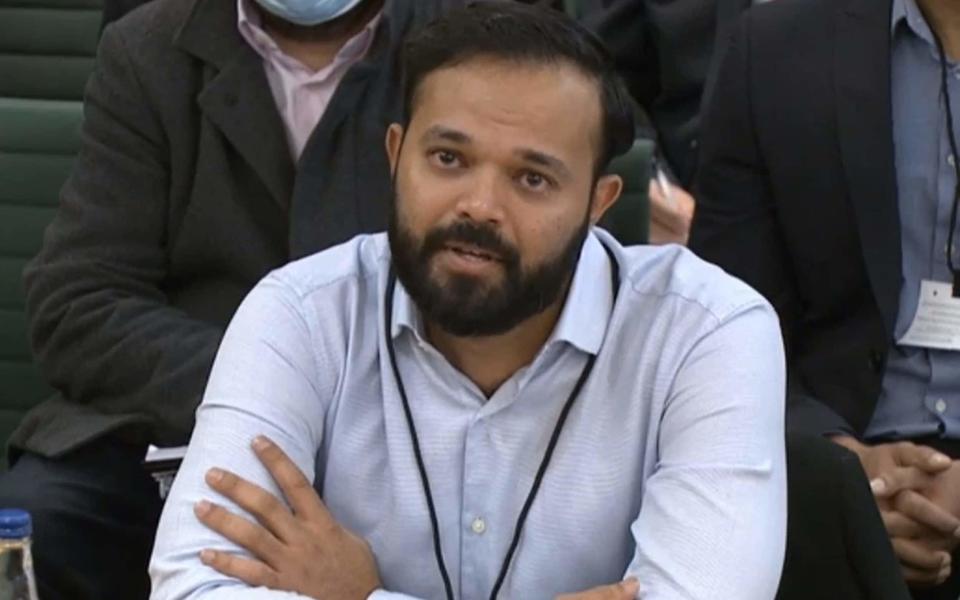ECB bungled investigation into Yorkshire racism will hurt England cricket team

It took seven months for charges to finally be issued over the Yorkshire racism scandal, a timeline which even the ECB's own former chairman, Colin Graves, admitted should have been "much quicker".
The case had already been the subject of an independent and parliamentary enquiry, but the end result is that the ECB now risk plunging England's World Twenty20 preparations into chaos after the disciplinary hearing was scheduled for October.
The likes of Adil Rashid being summoned to give evidence about English cricket’s worst racism scandal would be as far from an ideal build-up to one of the game’s flagship international tournaments as it is possible to imagine.
But the ECB has only got itself to blame for what would be merely the latest in a catalogue of calamities to have befallen it since Azeem Rafiq first blew the whistle over the affair almost exactly two years ago.
Had it not refused a request by Yorkshire for assistance investigating Rafiq’s allegations – the reasons for which were later called into question when it did intervene – the saga may have been long since over.
It certainly might have avoided the farce of several of Rafiq’s claims being upheld only for the crisis county to announce no-one would face any action over them.
It may also have prevented the findings being reinterpreted by a Yorkshire-appointed panel that ruled him being called a P--- was “banter”.

As it was, it was left to MPs sitting on the Digital, Culture, Media & Sport select committee to conduct a public show trial at which a tearful Rafiq aired harrowing testimony unchallenged under parliamentary privilege.
The months to have followed have been purgatory both for Rafiq and his alleged – and self-confessed – abusers.
Gary Balance, who admitted having called his former team-mate a P--- in “a situation where best friends said offensive things to each other”, has only just returned from a major break from the game with mental health problems.
Michael Vaughan, who denies telling Rafiq and other Muslim players, “Too many of you lot”, in 2009, has effectively been exiled by the BBC pending the outcome of the case.
But arguably the biggest victims of what has been a witch-hunt against anyone at Yorkshire caught up in the case have been members of the coaching team sacked en masse amid severe pressure from MPs and the existential threat of the club being stripped of England matches.
Ongoing Employment Tribunal proceedings to have taken place since have exposed that indiscriminate cull for what it was.
The other team that has lost out are England. When the ECB did finally issue charges, it announced them the day after England’s thrilling Test series victory against New Zealand. Focus should have been on Jonny Bairstow's brilliance but was instead back on Headingley.
Stating its “normal practice” was not to identify charged individuals, the names of the seven current and former Yorkshire players in the dock were nevertheless published almost immediately by the journalist who had exposed the full scale of the county’s racism scandal.
It was the ECB’s sharing of this information with whoever leaked the story that was among the triggers for an extraordinary attack on its handling of the case by the club’s last four chairmen, who demanded an independent inquiry into the whole affair.
Graves, Steve Denison, Robin Smith and Roger Hutton voiced a litany of concerns over the disciplinary proceedings opened against the club and individuals, including the amount of time the inquiry had taken and the lack of scrutiny over the ECB’s own refusal to investigate almost two years earlier.
Those fears were compounded when it emerged the following day that Rafiq had been treated to corporate hospitality by the governing body during England’s first Test against New Zealand at Lord’s, days before it issued charges over the Yorkshire racism scandal.
The stunning revelation saw the governing body accused of a lack of independence and creating the perception of “bias” against those in the dock.
A week later, and hours before the deadline for those charged by the ECB to respond, Andrew Gale sensationally refused to attend the disciplinary hearing into the scandal in a remarkable 3,500-word statement in which he denied “each and every” accusation against him and denounced the “witch hunt” into the case.

That hearing will take place before the Cricket Discipline Commission, the quasi-independent body set up by the ECB to adjudicate in such matters.
The format and timing of the proceedings is for the CDC to determine but it is in no-one’s interests for them to take place in October, regardless of whether Rashid and other potential witnesses are ordered to appear in person or simply remotely.
With no England or county matches between the end of December and end of January, this would be one delay surely everyone involved would welcome.

 Yahoo Sport
Yahoo Sport 





































